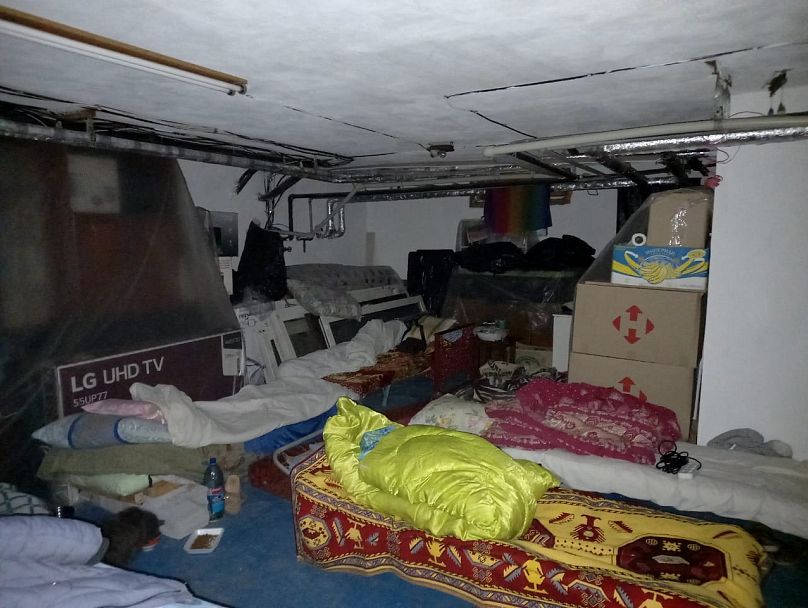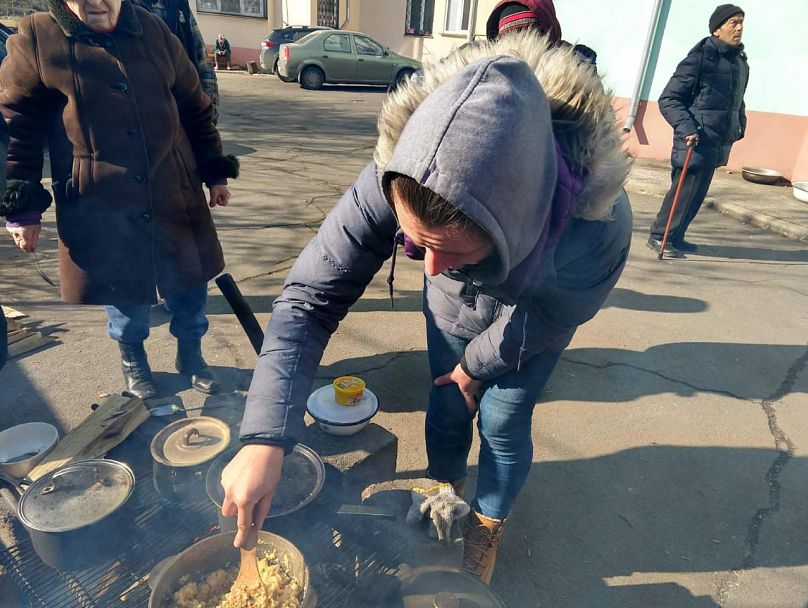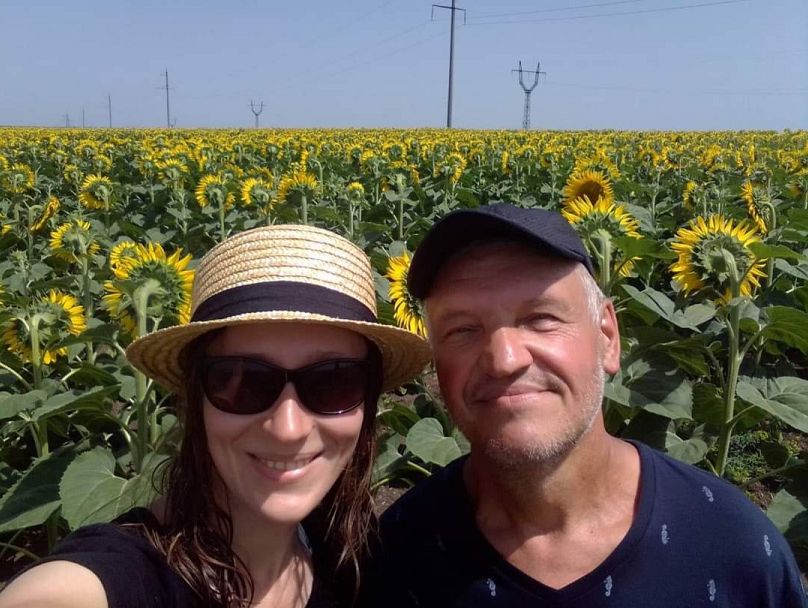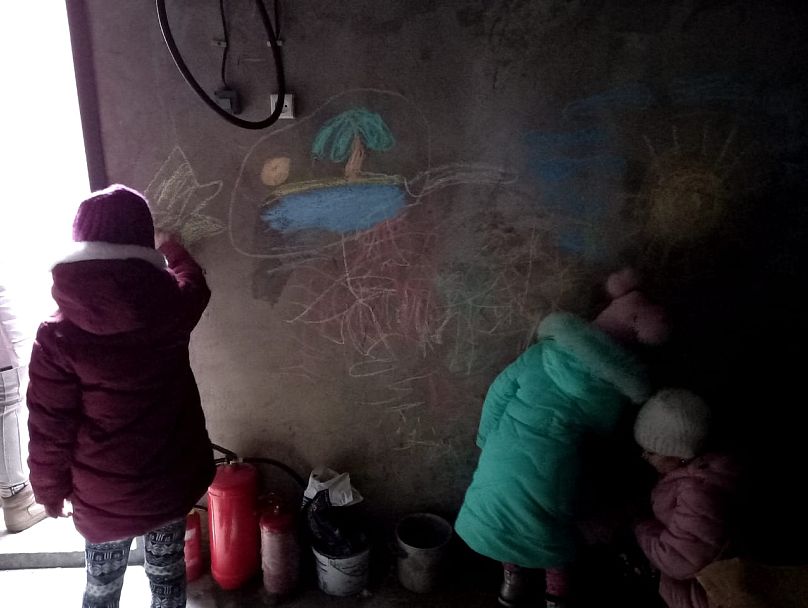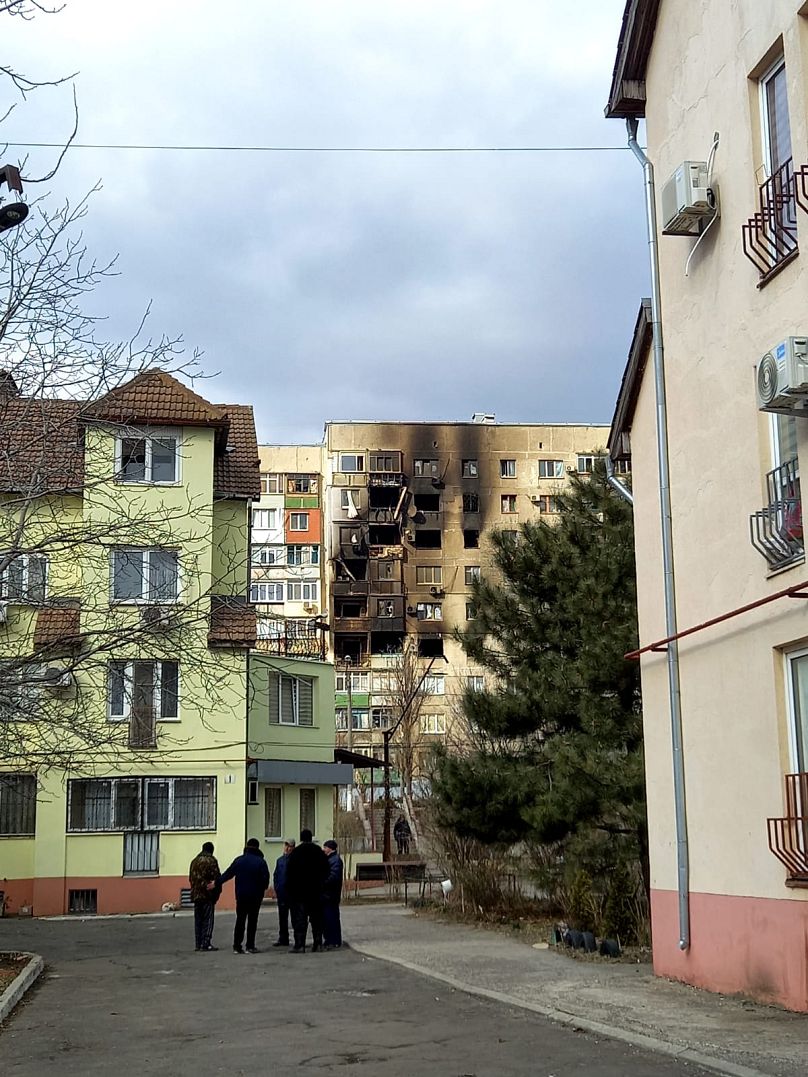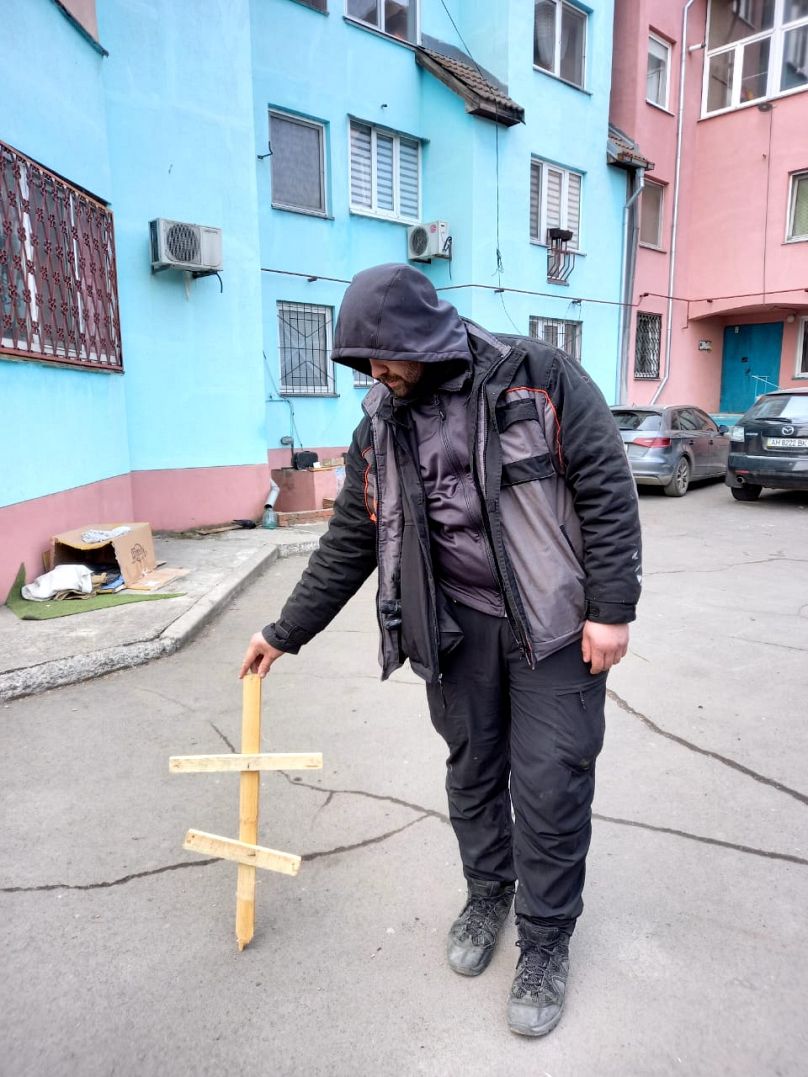Alina Beskrovna, a 31-year-old finance expert and Mariupol native, survived the first month of the siege in the city, managing to unexpectedly save herself, her mother, and their three cats in late March.
While the cruelty toward Ukrainian civilians projected through photographs and news segments bewilders the world, the ongoing siege of Mariupol continues to be the most shocking in its levels of destruction and absolute disregard for human life.
The remaining residents of the once-thriving southern port city of 432,000, encircled and constantly shelled by the Russian forces, have been facing starvation, thirst and the cold for almost eight weeks.
Alina Beskrovna, a 31-year-old finance expert and Mariupol native, survived the first month of the siege in the city, managing to unexpectedly save herself, her mother, and their three cats in late March.
The time she spent there was all about surviving, she told Euronews.
“I focused on just survival. We didn’t know if it would be possible to ever leave. I did not believe escape would be possible,” Beskrovna said.
“So my biggest fear, my absolute fear was twofold: one was being raped by Russians. The other was being taken to Russia by force or being forced to live in the so-called Donetsk People’s Republic without the possibility of ever moving,” she recalled.
Now in Copenhagen and on her way to Canada as a refugee, Beskrovna described the harrowing month of life under constant shelling in horrendous conditions, punctuated by having to bury people she had never met, all civilian victims of the siege.
“They shelled the grocery store nearby. Not everyone managed to escape. They shelled the nine-storey building across the street from us. Some people were sleeping in their apartments at night and got killed.”
“They shelled the private houses behind our cottage complex. People got killed. And we buried them,” Beskrovna said.
Situated on the northern shore of the Azov Sea, Mariupol has been a trading and manufacturing hub ever since it was founded on the site of a former Cossack encampment in the 18th century. Today, the city, its history, and its culture are largely gone.
In his daily address to Ukraine’s citizens, President Volodymyr Zelenskyy stated on Thursday that Mariupol has now been “completely destroyed”. Some 95% of the city is in ruins, with large portions completely uninhabitable.
About 21,000 citizens were estimated to have been killed in the city, Mariupol Mayor Vadym Boichenko said on Wednesday.
Russian President Vladimir Putin told his French counterpart Emmanuel Macron in late March that the bombardment would only end “when Ukrainian troops fully surrender Mariupol”.
The Ukrainian forces, trapped in the city together with the civilians, continue to refuse to lay down their arms, despite reports of them running out of ammunition and other supplies.
Waking up to war
An exchange student in her teens, Beskrovna went back to the US to get her MBA and returned to Mariupol three years ago, working in startup development, trying to use her knowledge of finance to help the startup scene.
“I stayed in Philadelphia for two years after getting my degree, but I felt that with the opportunities that were appearing in Mariupol, I should be there. Because that’s the place to make the most impact with my background, so I just moved back.”
“We recently launched the first venture studio, and we were helping startups connect with foreign investors,” Beskrovna said.
To Beskrovna and her compatriots, 24 February is etched in memory as the beginning of the war's next phase.
Although this time the Russian forces attempted to seize the entire country, Ukraine has been at war since 2014 and Russia's annexation of Crimea, followed by the outbreak of the conflict in the Donbas, she explained.
Nevertheless, the first day of the invasion caused both shock and surprise even for those in Mariupol, despite the city’s proximity to the war zone in the Donbas, making it briefly come under the so-called DNR’s control in 2014. The city also had to endure several skirmishes on its outskirts and outright assaults from DNR since.
“We count the war from the day ‘Little Green Men’ with no insignia appeared in Crimea, so this is the third stage of the war.”
“I was actually trying to help foreign journalists who were flocking to the city, so in my spare time, I would translate for them, fix for them, find contacts, create itineraries, stuff like that.”
“So that night, we were out with a Brazilian crew, finalising the itinerary for the next day, and having sushi and wine downtown at an awesome hip place that doesn’t exist anymore. We dropped them off at the hotel, I went back home.”
She woke up at around 6 in the morning — a very unusual time for her — after she felt a blast nearby.
“I woke up because of a weird feeling that was like when you go to the movies and watch an action movie or a war movie, and you sit way too close to the speaker. And it deafens you and it reverberates through your body, right?”
“I was hoping that the neighbour closed the metal garage doorway too aggressively. So I went on Facebook and scrolled down my newsfeed and I couldn’t believe my eyes.”
All of her friends and acquaintances on social media from Ukraine reported being woken up to the Russian invasion. “Blasts, fire, shelling right next to them. That’s how the war began.”
A friend's basement offers shelter from the shells
In the first couple of hours and days, people were completely oblivious to the situation, laughed it off or could not believe it was happening, Beskrovna said. In Mariupol, most people believed it was another Donetsk-like scenario and that it was not in the Russian interest to destroy the city.
Others who had the means to escape — especially those with cars — left the morning of the invasion. A friend from Donetsk, an internally displaced person in Mariupol, called her right away and warned her that things did not look good and that she should leave.
But Beskrovna did not have a car, so she could not go with the first wave.
“What happened to us was, a friend of ours lived on the other side of town and he lived in not the Soviet-type apartment building. He lived in this Yugoslav-style kind of cottage, with each cottage having four floors and those buildings had proper basements,” she described.
“When I say proper — they were dry and you could stand up in them. So that was luxurious.”
Beskrovna took him up on his offer to shelter there, immediately moving her mother and her cats.
She could not get a hold of her father, 66-year-old Oleksii Beskrovnyi, since 26 February. He is considered to be missing.
“We agreed that if something happens, he would walk over to where we were sheltering. But I never heard from him since.”
“He would not take the situation seriously. He would laugh it off, he would make jokes. I couldn’t get through to him, he would not understand what was happening.”
“He just came back from travelling throughout western Ukraine — this big two-week journey — and he kept saying he’s fine and he’s doing his laundry. Then he would send me pictures of his basement to supposedly console me that everything is fine.”
Beskrovna’s father is Russian, hailing from a village in the Kursk region. But he became increasingly angrier toward the invading Russians in the two days they were in contact.
After Oleksii went missing, she reached out to his brothers and sisters, who all live in Russia, and one of her aunts told her that the last time they spoke, he said, “if you jerks show up on my land, I will not look at you being relatives, I will shoot you point-blank.”
Stripping people of their dignity
Realising you are in the midst of war did not happen overnight, Beskrovna explained.
“In the beginning, everything seemed like a weird slumber party at your friend’s place. We had electricity, the public transportation was running in the city for the first two or maybe three days.“
And then, one by one, all signs of civilisation were deliberately destroyed by the Russians. First, they targeted the electric grid, she said.
"All of a sudden you need matches to light your gas stove, your boiler isn’t working, you don’t have any hot water. Your wifi is down so you’re completely dependent on the mobile phone network. You don’t have a way to charge your phone or your laptop. That’s when you start thinking ‘Oh I need matches, I need candles, batteries,” Beskrovna remembered.
Then, the Russian troops bombed the water supply infrastructure, with the nearest source of potable water a few kilometres away. “We thought, well, at least we have gas, and then they bombed the [main] gas pipe. Which means you have to collect wood, you have to cook on the open fire outside, and the shelling kept approaching.”
As they ran out of options to evacuate, Beskrovna and others at the shelter understood that they were trapped in a situation that was becoming increasingly dire.
“At this point, people realised that it wasn’t just the strategic military objects that the Russians were destroying. It was a deliberate kind of complete destruction of the entire district full of people.”
“And citizens were being used as hostages or human shields by the Russians because it’s something that could be used for possible negotiations — to sell this idea of ‘maybe Mariupol should be occupied by Russia just to spare the lives of hundreds of thousands of civilians.”
Her shelter also found itself in between the Ukrainian forces and the Russian army, backed by DNR troops and the Chechen units of Ramzan Kadyrov.
The 32 people in her basement, six of whom were children, realised they had to focus on survival.
Leaving the basement to walk for mere 20 metres could easily be life-threatening because of potential bombardment. The low temperatures and gusts of wind meant everyone was constantly freezing.
Just getting the water to boil on an open fire would take hours, and sometimes they had to risk their lives watching over the meal, even under shelling. With all the uncertainties, that meal could have been the last one in a while, Beskrovna recalled.
“Our survival depended on cooperation, and that’s what we did. We built an outhouse, we built a fire pit, we had a team of two, sometimes three guys fetching water for us, sweeping the asphalt by the entry by the doorway to get rid of all the shrapnel.”
“But you don’t know what day it is. You don’t know what time it is,” she said.
“You live and sleep in the same clothes day in and day out for a month. You can’t take a bath, you look like a hobo and you haven’t washed your hair in a month. But everyone is just like you so no one cares anymore. It’s a lifestyle I’d never think possible in the 21st century in an industrial, booming city.”
The gamble of leaving a besieged city
Beskrovna and some others from the basement managed to leave the city after a rumour spread that it might be possible for some civilians to escape through the checkpoints. She and a few others decided to test their luck.
“People were trying to get out in columns. They’d get together at 6 am, put white strips on their mirrors to show that they’re civilians, write ‘Children’ and go and pray that they’d get out alive because there was no green corridor — you could be shelled, you could be killed, you could be stuck in the crossfire.”
Fuel was in extreme demand in the city by this point, she recalled, with the prices reaching $10,000 per canister, but the friend who initially invited them to share the basement with him had about half of his tank left. On 23 March, six adults and four cats crammed into his car and left for the checkpoints.
It was the first time Beskrovna saw some of the extent of the damage and the sheer size of the Russian army's presence.
“We crossed two Ukrainian checkpoints and sixteen Russian checkpoints in between. The Russian ones were eerie. They were not hiding their attitude. They were mocking us, looking down on us, making fun. Just having a good time."
"Some of them looked like they didn't want to be there, but then, they were there,” she remembered.
The Russians made the men strip, looking for anything in the colours of Ukraine or national symbols like the trident, which they believed was proof of their relations to the armed forces or “Nazi-leaning tendencies”, detaining those they did not like.
The trip from Mariupol to Zaporizhzhia, which usually takes about three hours, took 14.5 hours along what Beskrovna describes as a hellish landscape of dead bodies, torn-apart civilian cars and Russian tanks blown into pieces, all signs of heavy fighting.
Ukrainians remain united in spite of Putin
Finding her way to safety, Beskrovna left Ukraine for Denmark through Zaporizhzhia and Lviv. She highlighted that she, her mother and their cats were made to feel welcome and helped along the way. And to her, it is a sign of national unity that Moscow’s aggression provoked in her compatriots.
Beskrovna is a speaker of both Russian and Ukrainian. As someone with a Russian background, she is adamant that the issue of differentiating between the two groups — something that Putin has emphasised, particularly in his speech on the eve of the invasion — is non-existent.
“Ever since 2008 or so, the Kremlin ramped up this rhetoric of how Russian speakers are stripped of their rights and hunted down, and prohibited from expressing themselves, and I remember thinking ‘I’ve never in my life experienced that.’”
The fierce resistance to Russian troops in cities like Kharkiv and Mariupol, where the Russian speakers comprise a significant majority, proves that Ukrainians are united in their desire to remain outside of Russia regardless of their heritage, she said.
“The language is not an issue because that’s what Putin is trying to do, he’s trying to monopolise the language and the claim is that whoever is a Russian speaker is theirs. And we just refuse to play along with that,” Beskrovna explained.
“Although we have been affected by the Russian empire for centuries, we still have this freedom-loving, self-organising, self-governing component of the Ukrainian Cossacks. We are not serfs, we are not slaves, and we will not tolerate being treated as such.”












